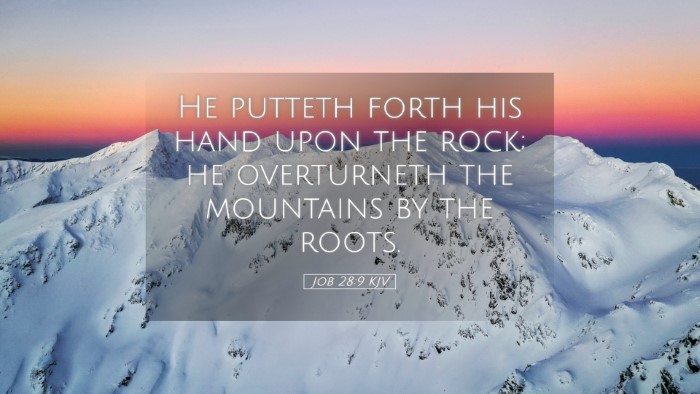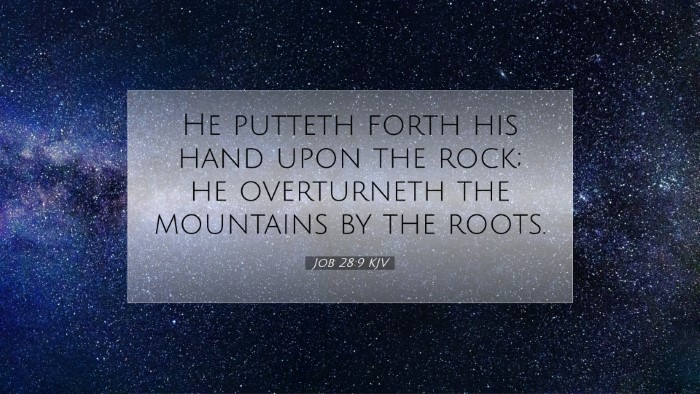Old Testament
Genesis Exodus Leviticus Numbers Deuteronomy Joshua Judges Ruth 1 Samuel 2 Samuel 1 Kings 2 Kings 1 Chronicles 2 Chronicles Ezra Nehemiah Esther Job Psalms Proverbs Ecclesiastes Song of Solomon Isaiah Jeremiah Lamentations Ezekiel Daniel Hosea Joel Amos Obadiah Jonah Micah Nahum Habakkuk Zephaniah Haggai Zechariah MalachiJob 28:9
Job 28:9 KJV
He putteth forth his hand upon the rock; he overturneth the mountains by the roots.
Job 28:9 Bible Commentary
Commentary on Job 28:9
Job 28:9 states, "He puts forth His hand upon the rock; He overturns the mountains by the roots." This verse offers a profound insight into God's sovereignty over creation and human endeavor. The imagery employed here is significant, depicting both the power of God and the limitations of human understanding in the quest for wisdom.
Contextual Overview
The Book of Job addresses the theme of suffering and the search for understanding amidst pain. Chapter 28 is often considered a poetic interlude reflecting on wisdom, its sources, and the futility of human efforts to attain it apart from God. In this specific verse, Job presents a metaphor that connects the physical world with spiritual truths, illustrating the Creator's might.
Insights from Public Domain Commentaries
Matthew Henry
Matthew Henry emphasizes the sovereignty and omnipotence of God as the Creator. His commentary points out that the verse highlights God's authority over the earth, symbolized by "putting forth His hand upon the rock" and "overturning the mountains." Henry explains that such actions demonstrate God's ability to reshape the world and underscores the insignificance of human attempts to seek wisdom through earthly means. He asserts this verse serves as a reminder that true wisdom comes from acknowledging God.
Albert Barnes
Albert Barnes provides a deep exegetical insight into this verse, focusing on the imagery of the hand of God. He notes that God's "putting forth His hand" symbolizes not just strength but also a deliberate action aimed at altering the natural order. Barnes suggests that in the face of such power, humanity’s quest for wisdom should be rooted in reverence for God’s supremacy, rather than in a mere desire for intellectual knowledge. This action of overturning mountains represents the barriers that human beings face in accessing true wisdom, which only God can reveal.
Adam Clarke
Adam Clarke, in his commentary, explores the relationship between human effort and divine power. He comments that the phrase "He puts forth His hand upon the rock" signifies that God is not passive but active in the world. Clarke posits that the mountains—representing obstacles—are overturned by God's authority, suggesting that God is engaged in the renovation of creation, reflecting His unchanging nature. His analysis encourages readers to understand that while humans strive for wisdom, it is ultimately God who holds control over the visible and the invisible.
Theological Implications
The examination of Job 28:9 invites serious theological reflection. It speaks to several core doctrines:
- Divine Sovereignty: The verse underscores that God has full control over creation, calling attention to His power to change and guide the course of events.
- The Nature of Wisdom: Wisdom is not merely intellectual but is intrinsically tied to a relationship with God. True wisdom must begin with the fear of the Lord (Proverbs 1:7).
- Human Limitation: The description of God’s actions serves as a humbling reminder of the limitations people face. Their innate desire for wisdom should be tethered to humility and dependence on God.
Practical Applications
For pastors, students, theologians, and Bible scholars, the lessons from Job 28:9 can be optimized into actionable insights:
- Leading with Humility: Acknowledge personal and communal limitations while encouraging congregants to seek divine wisdom over worldly knowledge.
- Encouraging Reverence: Cultivate a deep respect for God's power and sovereignty in preaching and teaching. Wisdom starts with a reverence that recognizes God's authority in all matters of life.
- Engaging with Creation: As stewards of creation, engage earnestly with the earth while remembering the Creator’s ultimate control over all things.
Conclusion
In summary, Job 28:9 serves as a vivid reminder of the utter supremacy of God in the universe and in the pursuit of wisdom. Through the insights of public domain commentaries, readers are called to reflect on their understanding of wisdom, recognize the constraints of human knowledge, and return to the foundational truths of trusting in God's sovereign nature as the ultimate source of wisdom. This passage should bolster faith, provoke thought, and inspire a commitment to seeking God above all else.


